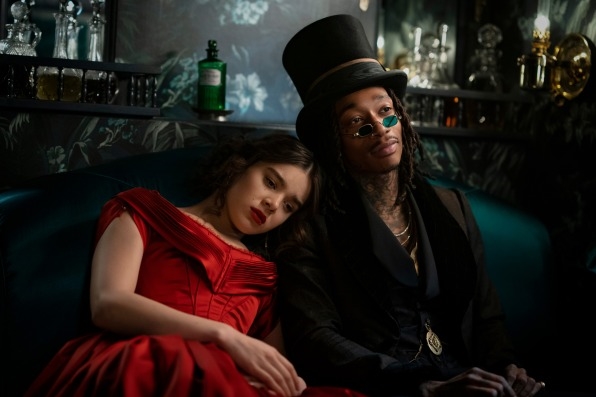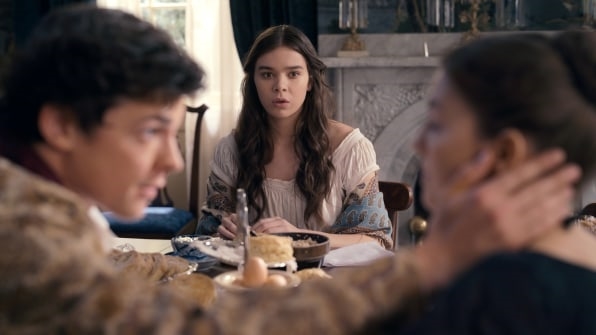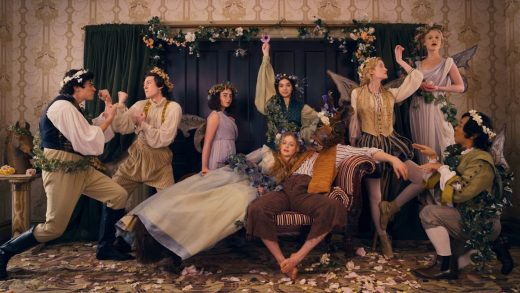Why Emily Dickinson fans and scholars are excited about ‘Dickinson’ on Apple TV+
Have you read the one about Emily Dickinson and Death?
“Because I could not stop for Death –
He kindly stopped for me –
The Carriage held but just Ourselves –
And Immortality.”
If you haven’t, don’t worry. Dickinson, one of several new series debuting November 1 on the Apple+ streaming service, dramatized it for you.
A glum but glam Emily Dickinson (Hailee Steinfeld), dressed in a sumptuous, off-the-shoulder red velvet gown, is sitting in a horse-drawn carriage with Death (a very seductive Wiz Khalifa). They are obviously enjoying each other’s company. Emily is afraid that her stern and conservative father won’t let her publish her poetry. Death tells her not to worry: Her poems will be published. She shakes her head and sighs, unconvinced. “My father will burn every copy if he has to,” she tells him. “Anything to prevent me from ruining the good name of Dickinson.”
“My darling,” he purrs. “You’ll be the only Dickinson they will talk about in 200 years.”

[Photo: courtesy of Apple TV+]
As it turns out, Death was right. Emily is the only Dickinson anyone is talking about 150 years after she wrote that poem—and 1,788 others—during her lifetime. But the dark-haired, free-thinking, fun-loving, living-out-loud Dickinson that Steinfeld channels is at odds with the traditional image of Dickinson alone in her quiet Amherst home gardening and baking bread in a starched white dress. Only the most passionate fans of the 19th century poet will recognize this alt-Emily.
But they all agree that modern readers should get to know the young, vivacious, and confident poet as a young woman.
Although the series includes fantasy sequences and a hip-hop soundtrack, it tries to stay faithful to Dickinson and her world. “The series did get in touch,” says Harvard University’s Leslie Morris, the Gore Vidal curator of modern books and manuscripts at Houghton Library that houses an extensive collection of Dickinson’s works and artifacts, including a reproduction of her writing room. “I was impressed with the attention to detail. The production people were very conscientious about getting it right,” she says, adding that she spotted several items from Harvard’s collection, including a famous portrait of Emily and her siblings in trailers for the series.
The other side of Emily
Although Dickinson departs from previous dramatizations of her life, scholars and fans agree that it’s not that far from the truth. “Even at the start, there were two very different Dickinsons,” says Christopher Benfey, a professor at Mount Holyoke College and a Dickinson scholar. She died in 1886, and her poems started appearing in print in the 1890s. First, there was the Emily in her white dress writing love poems about nature; someone who never married or fell in love, but if she did, it ended tragically.
But people knew there was another side of Dickinson, he says. There were rumors around Amherst that Emily and her younger sister, Lavinia, were a bit promiscuous. Others were shocked that some of her “poems” didn’t even rhyme. “For about 100 years, these two Dickinsons have been around, but the first image stuck,” he says. “Certain poems were attached to that image,” he says. “It was a very New England image: reclusive and lonely.”
Steinfeld’s Dickinson is hardly lonely. She is self-assured and determined, trying to reconcile her desire to write with the expectations for young women of her time. She pouts. She parties. She daydreams. She skips out on religious lectures at school. And most importantly, she writes.
Dickinson takes place during a pivotal time in the poet’s life, according to Martha Ackmann, a journalist and author of These Fevered Days, Ten Pivotal Moments in the Making of Emily Dickinson. Dickinson is on the verge of beginning her writing career in earnest. “There are many letters to friends from her teenage years. There’s a huge paper trail,” she says. “One of the things that stands out is that she is so social. She has lots of friends and makes friends easily. She’s recognized by one of her teachers at Amherst Academy as a great writer, and there’s even a little bit of jealousy among her peers.”
Ackmann says Dickinson knew she wanted to make something of her life. In one letter to a friend, there is a reference to setting up her desk and getting ready to write. “All things are ready,” she wrote. Ackmann says the letter reveals a young woman with the confidence and developing talent she knows will take her someplace.
“I have always been amazed that Dickinson knew her own worth as a poet,” says Susan Elizabeth Sweeney, Murray professor of arts and humanities at the College of the Holy Cross in Worcester, Massachusetts. Sweeney says that Dickinson once remarked that her “barefoot rank” was better than changing her style in pursuit of fame. “I believe she was confident that her poems would be understood and appreciated.”

Dickinson in the 21st century
Modern readers more likely to read Dickinson on their mobile devices relate to Dickinson’s poems for a variety of 21st century reasons. The writer Lotte Jeffs put it this way in a recent article for the London Sunday Times: “No one else has so elegantly articulated the complicated dichotomy of desire for public profile and privacy that shapes the way we navigate our online lives . . . .” She also says that Dickinson’s brevity—what she cleverly calls her “snackable presentation”—is another part of her appeal. “Ideas so tightly packed in so few words you could almost Tweet them in their entirety.”
And in the end, the poetry is the thing. “It’s a TV show, it’s not a scholarly monograph,” says Harvard’s Morris. “I’m hoping very much it will deal with some of the issues Emily herself dealt with: friendship, love, creativity, and just daily life. I hope it gets people back to reading poetry.”
Sweeney says the Dickinson she admires is an independent woman who managed to organize her life so she could devote it to poetry. With any luck that’s the Dickinson viewers will see in Dickinson.
(38)



